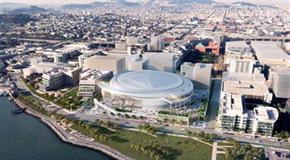Features
The Battle By The Bay

That could change with the proposed construction of a $1.4 billion arena for the Golden State Warriors basketball team in the city’s once-neglected Mission Bay district. During a time when cities are having second thoughts about committing public funding and resources for the privilege of hosting a professional sports team, this proposal should be a dream come true. But for some civic boosters, it’s a nightmare. Mission Bay was a graveyard of abandoned rail yards and shipping ports that moved to Oakland in recent decades.
But the University of California, San Francisco, moved in and built hospital and research facilities to create an impressive health care and life sciences hub. Despite tech’s reputation in the Bay Area, health care is now the city’s biggest industry. Adjacent to the UCSF medical campus is a piece of land that the Warriors have purchased rights to, and where the NBA champs propose to self-finance their new 18,000-seat arena home at no cost to the city or its taxpayers.
UCSF boosters would prefer the land be used to support biotech or another healthcare purpose. Both sides are stocked with well-heeled supporters ready to throw substantial money behind their disparate visions. Arena opponents have hired David Boies, one of the attorneys who won the landmark case for marriage equality at the U.S. Supreme Court this year, as well as the government’s antitrust case against Microsoft in 1998.
The group, called Mission Bay Alliance, has also retained high-powered California political consultant Jack Davis in the effort to stop the arena. Arena supporters include Salesforce founder Marc Benioff, who sold the rights to buy the Mission Bay land to the Warriors but is also a major hospital benefactor, venture capitalist Joe Lacob and Hollywood power player Peter Guber, who has a stake in the team. “If I want to see U2, I have to go to San Jose,” Benioff told the New York Times. “Without great sports franchises, we can’t be a great city.
This is about the future of San Francisco,” he added. “What is San Francisco going to be?” It’s a question that historically hasn’t been answered. Famously iconoclastic, “San Francisco has always been that other city with a different set of values,” Jeff Sheehy, a director of the California Institute for Regenerative Medicine, told the Times. His firm recently moved from San Francisco to Oakland when its rent-free lease expired and it discovered it has become prohibitively expensive to rent space in the city.
The Warriors originally proposed to build an arena on an abandoned pier on the San Francisco Bay, but faced aggressive opposition from grassroots groups arguing the venue would ruin the waterfront. Then Benioff offered 14 acres of land about a mile away that it purchased in 2010 for $278 million, and the Warriors plunked down a $50 million deposit for it. But if they build their dream arena, it will be over the nonprofit Bay Area Alliance’s dead body.
The group, said to consist of several Bay Area billionaires, incorporated itself in such a way that its membership can’t be identified, and is spoken for by Bruce Spaulding, a former senior vice chancellor of UCSF.
City officials and others believe the Warriors will ultimately prevail in court, should the dispute end up there, particularly since the land is private and the Warriors plan to finance the arena themselves. The city reportedly anticipates approving the arena’s environmental review by November, which could trigger the start of construction. But the Mission Bay Alliance alleges the 800-page EIR does not accurately account for noise, traffic and trash impacts
. Boies told the Times he doesn’t believe that any amount of mitigation of those issues will be sufficient to preserve the neighborhood, and a lawsuit is “not out of the question.”
If a claim is rejected, the group has let it be known that it’s not above forcing a referendum or otherwise stalling the project to death. In the meantime, the city and even UCSF Chancellor Dr. Sam Hawgood have offered “qualified” support for the arena, calling the healthcare-or-sports debate a “false dichotomy.”
The city, university and the Warriors are currently negotiating concerns about traffic, dedicated lanes for emergency vehicles and increased public transportation options and parking lots, and Hawgood told the paper he expects agreement to be reached by the end of September.